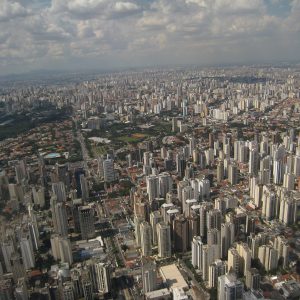The Stream, March 8: Cape Town Says Day Zero Will Likely Be Avoided In 2018
The Global Rundown
Cape Town officials say taps likely won’t run dry in 2018. A study finds that millions of Brazilians have been driven from their homes by natural disasters and large-scale construction since 2000. Experts say that Japan must do more to reduce the amount of radioactive water at the Fukushima nuclear plant. The opening of a new water treatment plant brings clean water to a First Nation in northwestern Ontario for the first time in 14 years. Drought-stricken Kenyans turn to tea trees as maize crops fail.
“The city now projects that, if there was to be no rainfall, Day Zero would arrive on 27 August 2018. As this date falls deep within the normal rainfall period, it is no longer appropriate to project the date without any consideration of rainfall.” –A statement by Cape Town deputy mayor Ian Neilson, in reference to the likelihood of the city’s taps running dry. Neilson added that Day Zero can be avoided if residents continue with current water-saving efforts. The Independent
In context: Circle of Blue’s coverage of Cape Town.
Latest WaterNews from Circle of Blue
São Paulo Heading To Another Dry Spell – Three years after the megacity nearly ran out of water, signs of a new crisis emerge.
Kansas Farmers Cut Ogallala Water Use – And Still Make Money – Groundwater conservation helped the imperiled aquifer and did not hurt the bottom line, farmers find.
By The Numbers
1 million tons Amount of radioactive water at the Fukushima nuclear plant. The destroyed plant, which suffered a meltdown during Japan’s 2011 earthquake and tsunami, produces nearly 400 tons of radioactive water each day. An underground, coolant-filled ice wall was installed to keep groundwater from flowing into the radioactive area, but experts say more efforts are needed to reduce the water. U.S. News & World Report
14 years Length of time that State Falls, a First Nation in northwestern Ontario, has been under a boil-water advisory. State Falls celebrated the opening of a new water treatment plant earlier this week, which will bring clean water to the community for the first time since 2004. CBC
Science, Studies, And Reports
An analysis by Forced Migration Observatory found that at least 7.7 million Brazilians have been forced to leave their homes since 2000 due to natural disasters and large-scale construction. More than 6 million were displaced by widespread flooding, droughts, and other disasters, while 1.2 million were forced out by mega-projects such as dams. The Guardian
On The Radar
A dry spell in Kenya has devastated traditional crops, such as maize, prompting the development of alternative crops. In Laikipia County, nearly 800 small-scale farmers were sold tea tree seedlings on credit, with a guaranteed buyer for the crops. This type of program, spearheaded by the UN and local NGOs, gives Kenyan farmers a chance to earn income even amid drought. Reuters
Kayla Ritter is a recent graduate of Michigan State University, where she studied International Relations and Teaching English to Speakers of Other Languages. She is currently based in Manton, Michigan. Kayla enjoys running, writing, and traveling. Contact Kayla Ritter





Leave a Reply
Want to join the discussion?Feel free to contribute!